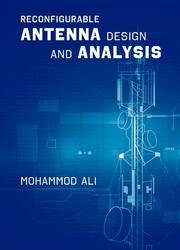Reconfigurable Antenna Design and Analysis
- Добавил: literator
- Дата: 8-07-2021, 04:13
- Комментариев: 0
 Название: Reconfigurable Antenna Design and Analysis
Название: Reconfigurable Antenna Design and AnalysisАвтор: Mohammod Ali
Издательство: Artech House Publishers
Год: 2021
Страниц: 275
Язык: английский
Формат: pdf (true)
Размер: 11.4 MB
This exciting new book focuses on the analysis and design of reconfigurable antennas for modern wireless communications, sensing, and radar. It presents the definitions of basic antenna parameters, an overview of RF switches and explains how to characterize their insertion loss, isolation, and power handling issues. Basic reconfigurable antenna building blocks, such as dipoles, monopoles, patches and slots are described, followed by presentations on frequency reconfigurable antennas, pattern reconfigurable antennas, and basic scanning antenna arrays. Switch biasing in an electromagnetic environment is discussed, as well as simulation strategies of reconfigurable antennas, and MIMO (Multiple Input Multiple Output) reconfigurable antennas. Performance characterization of reconfigurable antennas is also presented.
Chapter 1 starts with a basic introduction to reconfigurable antennas and illustrates the differences between frequency, pattern, and polarization reconfiguration. Chapter 2 describes relevant basic antenna parameters in a focused manner so that the reader does not have to consult an antenna textbook while reading this book. Discussions of antenna efficiency measurements using the Wheeler cap method and antenna mutual coupling are presented. Because most reconfigurable antennas attain their operation with the help of electronic switches, Chapter 3 focuses on that subject. Chapter 3 also presents the fundamentals of PIN diode, varactor diode, and radio frequency (RF) microelectromechanical systems (MEMS) switches. Simple analytical formulations on switch insertion loss and isolation calculation are provided. Chapter 4 presents the fundamental building blocks or antennas that may be used to design and build a reconfigurable antenna. Discussions on dipole, monopole, patch, slot, loop, and other antennas are presented along with their feeding methods. Chapter 5 presents a detailed overview of frequency reconfigurable antennas. Polarization reconfiguration is also presented in the same chapter. The topic of frequency reconfiguration is addressed in the context of antenna type (patch, dipole, slot) and the electronic switches used; for example, PIN diode, RF MEMS (discrete versus monolithic), photoconductive device, and varactor diode.
Chapter 6 discusses the various types of pattern reconfigurable antennas that are not phased arrays. For example, the electronically steerable parasitic array radiator (ESPAR) is presented that leverages dipole, monopole, and patch antennas. Chapter 7 presents a brief introduction to phased array or scanning array design, which includes phase shifter design, simple examples of microstrip patch phased array design, and phased array design examples from the literature. Chapter 8 discusses RF switch biasing, and Chapter 9 discusses reconfigurable antenna simulation strategies when they contain practical RF switches. Chapter 10 is focused on multiple-input multiple-output (MIMO) reconfigurable antennas. Fundamentals of MIMO or MIMO parameters are defined first, followed by MIMO antenna design examples from the literature. Finally, Chapter 11 presents reconfigurable antenna design for cognitive radio and millimeter-wave systems.
Скачать Reconfigurable Antenna Design and Analysis
Внимание
Уважаемый посетитель, Вы зашли на сайт как незарегистрированный пользователь.
Мы рекомендуем Вам зарегистрироваться либо войти на сайт под своим именем.
Уважаемый посетитель, Вы зашли на сайт как незарегистрированный пользователь.
Мы рекомендуем Вам зарегистрироваться либо войти на сайт под своим именем.
Информация
Посетители, находящиеся в группе Гости, не могут оставлять комментарии к данной публикации.
Посетители, находящиеся в группе Гости, не могут оставлять комментарии к данной публикации.
